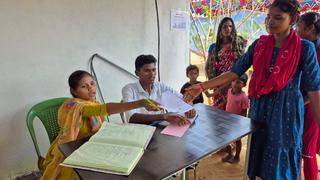
The health camp under way in Laxmidevipally mandal of Bhadradri Kothagudem district by ICAR-National Meat Research Institute, Hyderabad, and AIIMS-Bibinagar.
| Photo Credit: Special Arrangement
A strikingly high prevalence of anaemia among Koya and Gond tribal communities in Telangana has emerged as a key concern during a recent ‘One Health’ outreach held in Laxmidevipally mandal of Bhadradri Kothagudem district. The finding, observed during clinical examinations and field assessments, has brought renewed attention to long-standing health inequities in some of the most remote forested regions in the State.
The outreach was organised jointly by the ICAR-National Meat Research Institute (NMRI), Hyderabad, and the All India Institute of Medical Sciences (AIIMS)-Bibinagar, under the All India Network Programme on ‘One Health Approach to Prevent Zoonotic Diseases’ and the National One Health Programme for Prevention and Control of Zoonoses. The camp aimed at strengthening preventive health awareness, extending essential medical services and building zoonotic disease surveillance systems among particularly vulnerable tribal groups (PVTGs).
“The initiative serves as a crucial bridge between scientific research and community realities, enabling early detection of diseases, stronger health literacy and trust-based engagement,” said Rahul Narang, who heads the department of Microbiology and serves as regional coordinator for One Health.
The Bhadradri Kothagudem district, home to dispersed Koya and Gond settlements, continues to face deep-rooted structural barriers to healthcare. Poverty, geographical isolation, language differences and dependence on traditional healing practices have left these communities with limited access to regular medical care. As a result, anaemia, malnutrition, malaria, tuberculosis and acute respiratory infections remain highly prevalent, especially among women and children.
Approximately 150 tribal residents attended the camp, where doctors from AIIMS-Bibinagar provided consultations on maternal and child health, nutritional deficiencies, chronic respiratory problems and recurrent febrile illnesses. The medical team included specialists from obstetrics and gynaecology, paediatrics and clinical microbiology, working under the supervision of Dr.Narang.
Hygiene and sanitary kits were also distributed to reinforce behaviour change, with a particular focus on women’s health and menstrual hygiene. A central component of the initiative was the collection of human serum samples for zoonotic disease surveillance. Parallel animal and environmental sampling carried out by the NMRI team aimed to build an integrated early-warning system in tribal ecosystems.
Published – November 24, 2025 09:27 pm IST















Leave a Reply